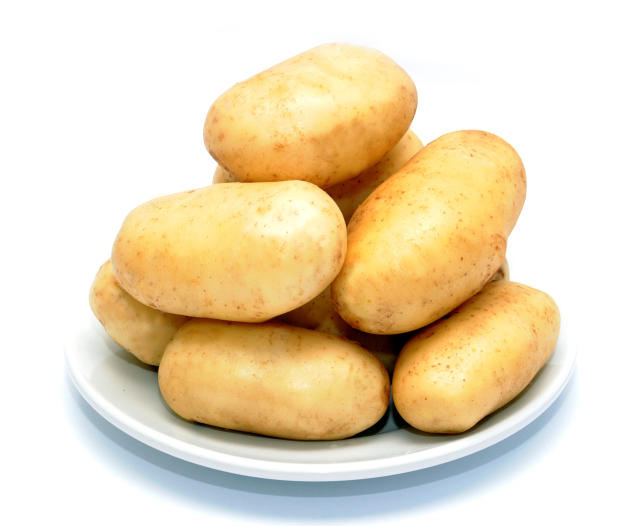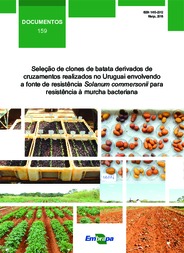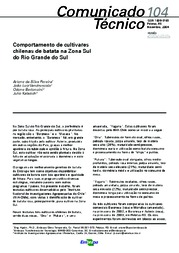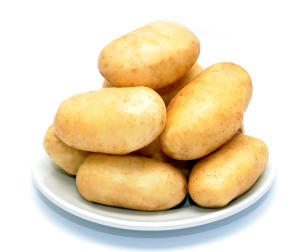Regional/Procisur Potato Consortium comprises technical exchange between five countries
Regional/Procisur Potato Consortium comprises technical exchange between five countries
Embrapa has participated in an agreement that constitutes the Regional/Procisur Potato Consortium, with the researcher Arione Pereira, from the research unit in Pelotas, RS, as initial coordinator. The process was achieved through cooperation between five countries, through which the Corporation is going to develop new potato cultivars, and which is considered of high strategic relevance for breeding and genetic improvement programs and product placement in the market. Embrapa has dozens of clones and a gene bank with about 400 accessions.
The Consortium
A regional alliance called Consortium is established in order to complement breeding programs' capacities, and make potato cultivars jointly developed by the member countries of the South Cone Cooperative Program for Agrifood and Agroindustrial Development (Procisur) - Argentina, Brazil, Chile, Paraguay and Uruguay - and also by third-party countries accessible, so as to meet demands from consumer markets.
The Consortium aims to test and exchange potato clones between breeding programs by the institutions involved in order to develop cultivars for the market conditions of Southern Cone countries, as well as promote and disseminate the cultivars generated by the Consortium to other countries. The Consortium has Managing Committee and a Technical Committee to optimize the activities of the regional alliance. The institutions that are involved in the alliance are the National Institute of Agricultural Technology (INTA/Argentina), Embrapa, Chile's Institute of Agricultural Research (INIA/Chile), Paraguay's Institute of Agricultural Technology (IPTA/Paraguay) and the National Institute of Agricultural Research of Uruguay (INIA/Uruguay).
The researcher Waldyr Stumpf, from the Intelligence Team, deems the result rewarding. He also confirmed the Corporation's Executive Secretariat liaison with the Procisur's Technical Team as important for the conclusion of this process. The constitution of the Regional Potato Consortium by Southern Cone countries especially demonstrates Procisur's new stance towards articulating, potencializing and making interinstitutional action possible with the prospect of positive economic and social impacts for the Region", Stumpf remarked. According to him, the agreement will enable enhancing and characterizing the coordination and exchange between research teams, which will start a network for the exchange of experiences and innovation.
Rationale for the Consortium
In Brazil, potatoes are the most cultivated vegetable (80% of the horticultural area), with the prevalence of cultivars developed abroad. In Chile, potatoes are the third most important crop, with cultivars developed by INIA occupying an important position in the country's potato chain, but it still relies on foreign material. In Argentina, the portfolio of cultivars is reduced and most businesses are based on a single foreign cultivar. In Uruguay, an American cultivar still represents approximately 50% of the area, and other cultivars originating from the Northern Hemisphere are also used, with little participation of national cultivars.
Breeding programs in the countries involved in the Consortium aim at the development of cultivars with similar traits, such as high dry matter content for industrial purposes, adaptation to mechanization, quality for culinary use, resistance to main diseases, and others. An opportunity to increase the chances of obtaining new cultivars, potentializing the efforts and funds allocated by the institutions.
History of the Consortium
Cooperation for potato breeding and genetic improvement started in the 1980s, between four countries, with successful experiences, which reflected in the practices and techniques that the programs use. The first joint potato cultivar initiatives were held between the Embrapa and INIA/Chile, resulting in a mutually beneficial exchange. But it was only in 2010, in Peru, that there was the idea of creating a formal instrument that allowed to coordinate and complement the programs' capacities in potato breeding, with each one of the participating institutions.
Production data per country (in 2016)
Potato production
- Argentina - 1,750 million tons - 277 million dollars
- Brazil - 3.851 million tons - 2.097 billion dollars
- Chile - 1.166 million tons - 430 million dollars
- Uruguay - 89,000 tons - 72 million dollars
- Paraguay - 3,600 tons - 3 million dollars
Potato production in South America
6.860 million tons of potato in Southern Cone countries
That accounts for 44.3% of production in South America
Translation: Mariana Medeiros
Cristiane Betemps (MTb 7418/RS)
Embrapa Temperate Agriculture
Press inquiries
clima-temperado.imprensa@embrapa.br
Phone number: +55 53 3275-8215
Further information on the topic
Citizen Attention Service (SAC)
www.embrapa.br/contact-us/sac/




